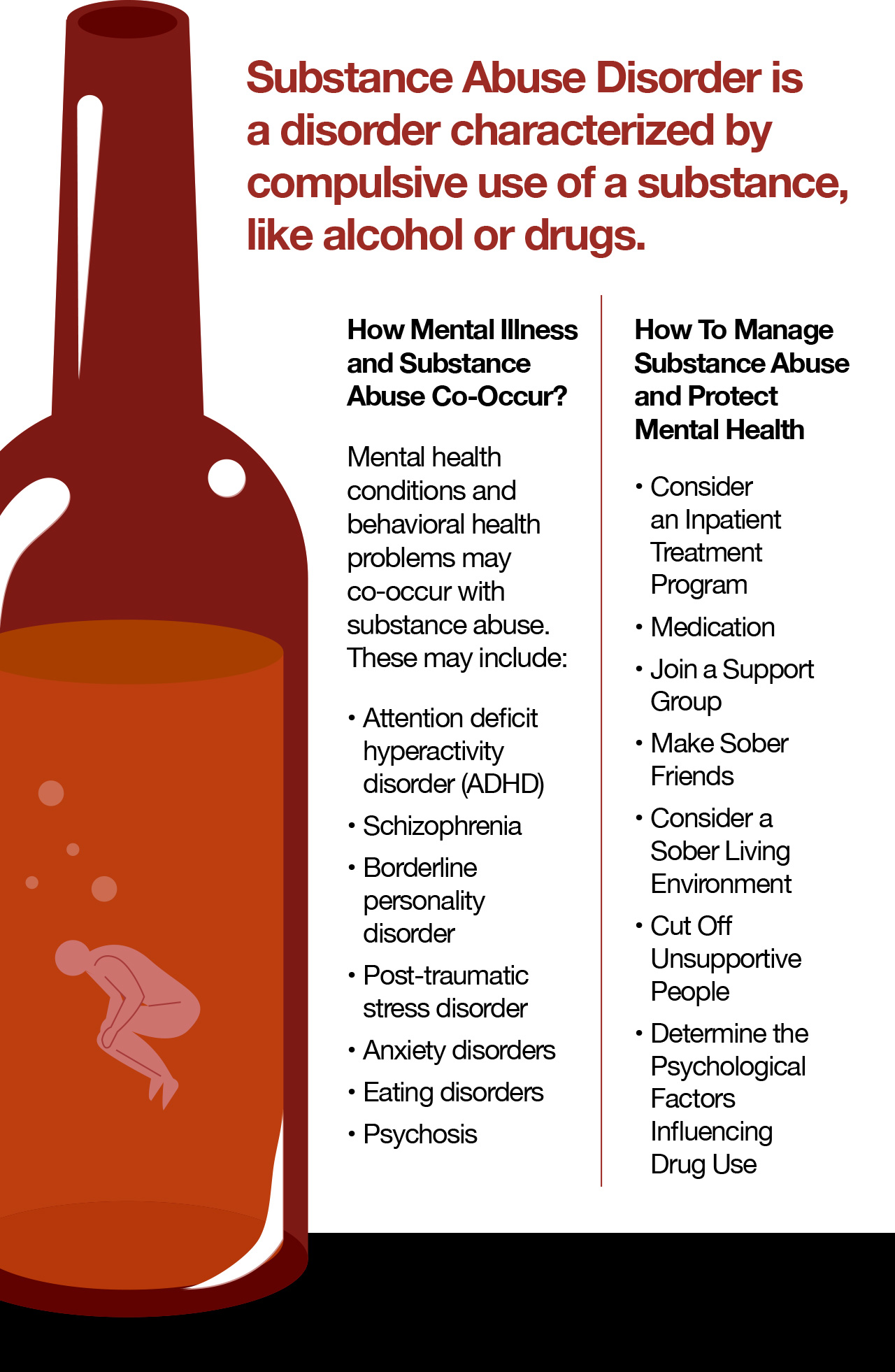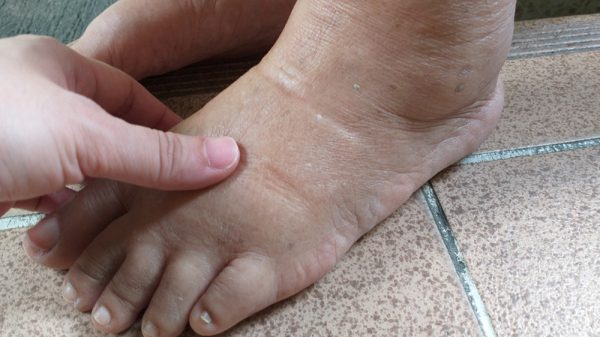Substance abuse and mental health are intricately linked and are often co-occurring. Underlying mental health issues may lead to substance abuse as a form of self-medication. On the other hand, substance abuse may actually exacerbate existing mental illness or trigger the development of mental illness. Read on to find out how substance abuse and mental health are connected, and what you can do to recover.
What You Should Know About Substance Abuse Disorder
Substance abuse is a disorder that is characterized by compulsive use of a substance, like alcohol or drugs. A substance abuser will use the drug at the expense of nearly everything else. For example, substance abuse often leads to poor performance in school and work, breakdown of friendships, poor decision making, and illegal activity.
Substance abuse can have serious effects on your physical and mental health and well-being. When adolescents use drugs, normal brain development can be affected. However, there are a variety of treatment approaches that can help guide and support you on your journey to recovery. Treatment providers will also help tailor treatment services to your specific needs.
The American Psychiatric Association describes substance use disorder as the continuous use of a substance despite the negative consequences. (1) In severe cases, substance use disorder is characterized as drug addiction. (1)
How Mental Illness and Substance Abuse Co-Occur
Mental health conditions and behavioral health problems that may co-occur with substance abuse may include attention deficit hyperactivity disorder (ADHD), schizophrenia, borderline personality disorder, post-traumatic stress disorder, anxiety disorders, eating disorders, and psychosis.
Depression is commonly associated with substance use. Individuals with depression may be more inclined to drink alcohol in excess and use drugs in an effort to numb the pain and escape from reality.
Alcohol and drugs may not necessarily cause depression, it can exacerbate underlying depression or mental illness. In individuals with unipolar depression, alcohol and drugs may temporarily provide relief, while exacerbating depressive symptoms in the long term. For individuals with bipolar disorder, substance use may trigger a depressive episode.
Drug use often exacerbates underlying depression because of its impact on neurotransmitters and nervous system function. In addition to the impact on neurotransmitters and other body functions, drugs often increase inflammation and oxidative stress in all body systems. The brain is particularly vulnerable to oxidative stress, which describes the buildup of waste material that inhibits cells from functioning normally. Oxidative stress in the brain can interfere with normal brain transmissions and worsen anxiety and depression.
Let’s take a look at alcohol as an example. Individuals with anxiety may be more prone to reach for a drink, because of alcohol’s soothing effects. However, chronic alcohol consumption may disrupt the careful balance of inhibitory and excitatory neurotransmission. Inhibitory processes calm the mind, while excitatory processes activate the mind. Long-term, chronic alcohol abuse has negative effects on the functions of neurotransmitters like gamma-aminobutyric acid (GABA), dopamine, serotonin, and their receptors. (2)
What Can You Do to Manage Substance Abuse and Protect Mental Health?
If you are struggling with substance abuse and mental health concerns, there are steps you can take to manage these conditions.
Consider an Inpatient Treatment Program
Addiction treatment and addiction recovery is tough when you’re doing it alone. Entering a treatment program can provide structure for the initial part of your recovery journey. An inpatient treatment facility can be particularly helpful by removing you from your environment and creating distance between you and triggers. An outpatient treatment program can also help provide structure by holding you accountable to appointments with physicians and mental health specialists. The resources available at mental health treatment centers can also provide helpful referrals and connect you to the best resources for your needs. Plus, many treatment centers have health professionals who specialize in dual diagnosis and treat both mental health disorders and co-occurring substance abuse.
Medication
The right medication is a valuable tool for managing substance use disorder and mental health. Medication-assisted can be particularly helpful for opioid abusers. Medications are also useful for treating underlying mental illnesses.
Joining a Support Group
Alcoholics Anonymous (AA) and Narcotics Anonymous (NA) are nation-wide programs that connect recovering substance abusers through in-person meetings and online platforms. AA and NA are support groups that provide guidance for living sober and are structured around a 12-steps that many recovering addicts find helpful.
Make Sober Friends
Though millions of Americans drink, there are also millions of Americans who don’t drink. It’s just a matter of finding them. Making sober friends is crucial for maintaining your sobriety. Surrounding yourself with others who have had similar experiences creates a supportive, team-oriented environment. Creating your support system can help you maintain a life that revolves around sobriety.
Consider a Sober Living Environment
Going to a treatment program and returning to the same environment where you used drugs increases the likelihood of relapsing. Instead of returning to your previous environment, consider moving into a sober living environment. Recovery housing and transitional housing settings are designed to provide structure and support in a drug-free environment. Many recovery housing options also offer services like life skills support, employment support, educational opportunities, and social activities.
Cut Off Unsupportive People
Though it may seem harsh to drop friends who aren’t supportive, it’s imperative that you prioritize yourself during your recovery process. Staying in contact with individuals you used to use with will only make recovery more difficult, and relapse more likely. Instead, stay connected to those who support your new sober way of living.
Determine the Psychological Factors Influencing Drug Use
Many times, psychological factors underlie the physical urge to use drugs. These factors may include an undiagnosed mental illness, trauma, or other forms of psychological pain. In many cases, using alcohol and drugs is a self-medication technique to manage the underlying psychological issue. Determining the psychological factors driving your desire to drink will be essential for fighting cravings and maintaining sobriety.
Therapy is an invaluable resource for managing the psychological factors associated with addiction. Therapists use a variety of effective techniques like cognitive behavioral therapy (CBT) and supporting stress management techniques, like mindfulness.
Resources
If you are worried that you, a family member, or loved one is struggling with substance abuse and/or mental health issues, it’s important to have resources on hand for support.
- Your doctor: Your health care provider can assess your symptoms and provide referrals to mental health services, behavioral health support, and treatment options.
- SAMHSA: The Substance Abuse and Mental Health Services Administration is part of the U.S. Department of Health and Human Services and provides support for and resources through the Center for Substance Abuse Prevention.
- NIDA: The National Institute on Drug Abuse provides information, research, and training.
- CDC: The Centers for Disease Control and Prevention provide helpful information and resources regarding drug use, alcohol use, and public health.
Key Takeaways: Substance Abuse and Mental Health
Substance abuse and mental health are interlinked. A substance abuse problem often indicates an underlying mental health issue, such as depression, anxiety, or trauma. Individuals with mental health conditions may be more likely to reach for drugs to self-medicate. On the other side of the coin, substance use may worsen or trigger existing mental health conditions. Luckily, there are steps you can take to treat both substance use disorders and mental health problems. Your physician, treatment programs, and support groups are crucial for fighting substance abuse and supporting your mental health.

References:
(1) https://www.psychiatry.org/patients-families/addiction/what-is-addiction























